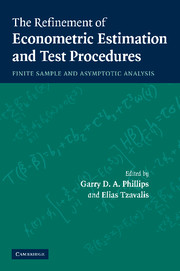Book contents
- Frontmatter
- Contents
- List of figures
- List of tables
- List of contributors
- Preface
- Acknowledgements
- Michael Magdalinos 1949–2002
- Introduction
- 1 Conditional Heteroskedasticity Models with Pearson Disturbances
- 2 The Instrumental Variables Method Revisited: On the Nature and Choice of Optimal Instruments
- 3 Nagar-Type Moment Approximations in Simultaneous Equation Models: Some Further Results
- 4 Local GEL Methods for Conditional Moment Restrictions
- 5 Limit Theory for Moderate Deviations From a Unit Root Under Weak Dependence
- 6 The Structure of Multiparameter Tests
- 7 Cornish-Fisher Size Corrected t and F Statistics for the Linear Regression Model with Heteroscedastic Errors
- 8 Non-Parametric Specification Testing of Non-Nested Econometric Models
- 9 Testing for Autocorrelation in Systems of Equations
- 10 Alternative Approaches to Estimation and Inference in Large Multifactor Panels: Small Sample Results with an Application to Modelling Asset Returns
- 11 Judging Contending Estimators by Simulation: Tournaments in Dynamic Panel Data Models
- 12 A Statistical Proof of the Transformation Theorem
- 13 On the Joint Density of the Sum and Sum of Squares of Non-Negative Random Variables
- 14 Conditional Response Analysis
- References
- Index
11 - Judging Contending Estimators by Simulation: Tournaments in Dynamic Panel Data Models
Published online by Cambridge University Press: 22 September 2009
- Frontmatter
- Contents
- List of figures
- List of tables
- List of contributors
- Preface
- Acknowledgements
- Michael Magdalinos 1949–2002
- Introduction
- 1 Conditional Heteroskedasticity Models with Pearson Disturbances
- 2 The Instrumental Variables Method Revisited: On the Nature and Choice of Optimal Instruments
- 3 Nagar-Type Moment Approximations in Simultaneous Equation Models: Some Further Results
- 4 Local GEL Methods for Conditional Moment Restrictions
- 5 Limit Theory for Moderate Deviations From a Unit Root Under Weak Dependence
- 6 The Structure of Multiparameter Tests
- 7 Cornish-Fisher Size Corrected t and F Statistics for the Linear Regression Model with Heteroscedastic Errors
- 8 Non-Parametric Specification Testing of Non-Nested Econometric Models
- 9 Testing for Autocorrelation in Systems of Equations
- 10 Alternative Approaches to Estimation and Inference in Large Multifactor Panels: Small Sample Results with an Application to Modelling Asset Returns
- 11 Judging Contending Estimators by Simulation: Tournaments in Dynamic Panel Data Models
- 12 A Statistical Proof of the Transformation Theorem
- 13 On the Joint Density of the Sum and Sum of Squares of Non-Negative Random Variables
- 14 Conditional Response Analysis
- References
- Index
Summary
Introduction
The joint occurrence in dynamic panel data models of individual specific effects and of lagged dependent variables complicates the statistical inference on the model parameters considerably. A great number of alternative techniques for the estimation of dynamic panel data models have been suggested over the last few decades, see inter alia Balestra and Nerlove (1966), Anderson and Hsiao (1981, 1982), Holtz-Eakin et al. (1988), Arellano and Bond (1991), Ahn and Schmidt(1995, 1997), Blundell and Bond (1998) and Hsiao et al. (2002). As a rule these techniques claim particular desirable asymptotic properties under specific circumstances. Various Monte Carlo studies have been undertaken in order to find out how well (variants of) these methods work in finite samples, see inter alia Nerlove (1967, 1971), Bhargava and Sargan (1983), Arellano and Bond (1991), Kiviet (1995), Blundell and Bond (1998), Judson and Owen (1999), Blundell et al. (2000), Harris and Mátyás (2000, 2004), Andrews and Lu (2001), Doornik et al. (2002), Hsiao et al. (2002), Alvarez and Arellano (2003), Bun and Kiviet (2003, 2005) and Doran and Schmidt (2005). The main purpose ofthis study is to clarify that in most of these simulation studies the focus has been too narrow, at least regarding particular aspects, to enable fair and fully informative conclusions on the qualities of the alternative inference procedures examined. Progress in this line of research could have been more efficient, as we shall argue, if the designs of these Monte Carlo studies had been less restrictive and more transparent.
- Type
- Chapter
- Information
- The Refinement of Econometric Estimation and Test ProceduresFinite Sample and Asymptotic Analysis, pp. 282 - 318Publisher: Cambridge University PressPrint publication year: 2007
- 17
- Cited by



